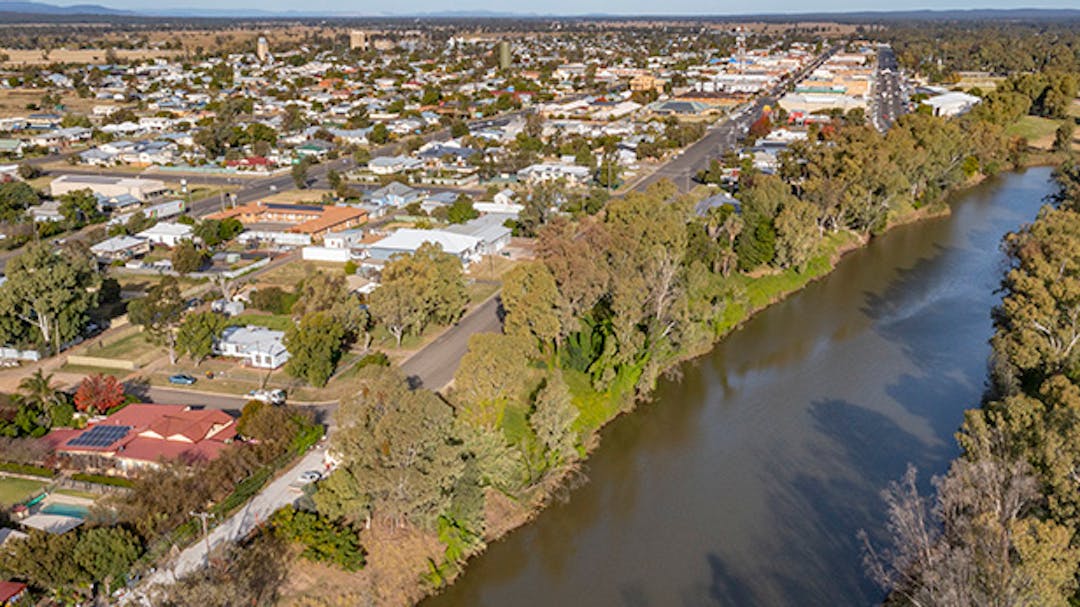Research Theme Leads: CSIRO and Deakin University
The Murray–Darling Basin is one of the world’s most variable climate regions. Catchment inflow during a wet year can be more than 20 times greater than the inflow in a dry year. However, it is also a system facing profound future challenges to adapt to a hotter, drier climate. The aims of this theme are to:
- better understand how climate change will impact the Murray–Darling Basin
- identify options to adapt to change
- evaluate potential outcomes for Basin values.
Climate change impacts will occur either directly through the effects of reductions in rainfall on river flows, or indirectly through other threats such as the increased threat of bushfire. The adaptation research will synthesise current knowledge, deliver new modelling methods, and generate projections of plausible futures of water availability in the Basin.
The research will identify adaptation options and evaluate their efficacy across economic, environmental, social and First Nations’ values. The research outcomes aim to support policy decisions and reduce the risk of outcomes that are more harmful than helpful.
Because of the inter-related and overlapping nature of the research questions below, 3 projects comprising a series of activities are proposed to:
- Enhance the foundational science that supports understanding the direct and indirect impacts of climate change on Basin water management.
- Develop a toolkit for assessing adaptation options.
- Investigate and assess a range of those adaptation options designed to address the 5 proposed research questions holistically.
The first project will produce a synthesis of existing knowledge on the indirect impacts of climate change on water demand and supply. It will deliver new validated modelling methods for characterising the interactions between climate changes and those indirect impacts on water demand and supply, enabling an evaluation of the relative impacts of each effect.
The second project will produce a scan of Commonwealth tools currently used for water planning purposes and a scan of existing workflows used by the MDBA and CSIRO. An architecture for the toolkit workflow will be designed, demonstrated and implemented. Flow-related values and vulnerabilities across the Basin will be assessed and updated, and new tools added to the toolkit. The toolkit will then be implemented to support the adaptation investigations in Project 3.
The third project will produce a classification system for adaptation options and a prioritisation of those options for the purpose of selecting adaptation investigations. Adaptation investigations will include a ‘no-regrets’ adaptation investigation into MDBA adaptation options, and the trade-offs associated with those options. Additional adaptation investigations will target the range of potential adaptation options. For a selected number of those, pilot implementation will occur where practical.
A fourth project will produce syntheses of research across the climate adaptation theme, with a focus on Basin-wide recommendations. Capacity development will also be a key outcome.
Summary of key questions, outputs, and outcomes for the Climate Adaptation theme.
| Key research questions | Key research outputs and outcomes |
|---|
- Which of the Basin’s economic, social, environmental, and cultural values are most vulnerable to the flow-related impacts of climate change?
- How do other threats interact with climate change to affect vulnerabilities?
- What is the best way to evaluate the effectiveness of water management arrangements to manage risks, including climate change?
- What adaptation options can provide better protection to vulnerable values in the basin?
- How do we undertake climate adaptation at regional scales that are most relevant to communities and environmental assets?
| - Foundational science – an improved understanding of the water-related impacts of the future climate, both through direct (i.e. hydrological) and indirect (e.g. bushfires) changes.
- Science applications & assessment toolkit – an enhanced ability to assess and compare the outcomes of adaptation options for catchment & Basin-scale water planning under climate change.
- On-ground climate adaptation case studies – 4–6 strategically selected case studies to identify and explore adaptation pathways at multiple scales and across values, including through community participation.
|
Any enquiries can be sent to MDWERP@mdba.gov.au.
Research Theme Leads: CSIRO and Deakin University
The Murray–Darling Basin is one of the world’s most variable climate regions. Catchment inflow during a wet year can be more than 20 times greater than the inflow in a dry year. However, it is also a system facing profound future challenges to adapt to a hotter, drier climate. The aims of this theme are to:
- better understand how climate change will impact the Murray–Darling Basin
- identify options to adapt to change
- evaluate potential outcomes for Basin values.
Climate change impacts will occur either directly through the effects of reductions in rainfall on river flows, or indirectly through other threats such as the increased threat of bushfire. The adaptation research will synthesise current knowledge, deliver new modelling methods, and generate projections of plausible futures of water availability in the Basin.
The research will identify adaptation options and evaluate their efficacy across economic, environmental, social and First Nations’ values. The research outcomes aim to support policy decisions and reduce the risk of outcomes that are more harmful than helpful.
Because of the inter-related and overlapping nature of the research questions below, 3 projects comprising a series of activities are proposed to:
- Enhance the foundational science that supports understanding the direct and indirect impacts of climate change on Basin water management.
- Develop a toolkit for assessing adaptation options.
- Investigate and assess a range of those adaptation options designed to address the 5 proposed research questions holistically.
The first project will produce a synthesis of existing knowledge on the indirect impacts of climate change on water demand and supply. It will deliver new validated modelling methods for characterising the interactions between climate changes and those indirect impacts on water demand and supply, enabling an evaluation of the relative impacts of each effect.
The second project will produce a scan of Commonwealth tools currently used for water planning purposes and a scan of existing workflows used by the MDBA and CSIRO. An architecture for the toolkit workflow will be designed, demonstrated and implemented. Flow-related values and vulnerabilities across the Basin will be assessed and updated, and new tools added to the toolkit. The toolkit will then be implemented to support the adaptation investigations in Project 3.
The third project will produce a classification system for adaptation options and a prioritisation of those options for the purpose of selecting adaptation investigations. Adaptation investigations will include a ‘no-regrets’ adaptation investigation into MDBA adaptation options, and the trade-offs associated with those options. Additional adaptation investigations will target the range of potential adaptation options. For a selected number of those, pilot implementation will occur where practical.
A fourth project will produce syntheses of research across the climate adaptation theme, with a focus on Basin-wide recommendations. Capacity development will also be a key outcome.
Summary of key questions, outputs, and outcomes for the Climate Adaptation theme.
| Key research questions | Key research outputs and outcomes |
|---|
- Which of the Basin’s economic, social, environmental, and cultural values are most vulnerable to the flow-related impacts of climate change?
- How do other threats interact with climate change to affect vulnerabilities?
- What is the best way to evaluate the effectiveness of water management arrangements to manage risks, including climate change?
- What adaptation options can provide better protection to vulnerable values in the basin?
- How do we undertake climate adaptation at regional scales that are most relevant to communities and environmental assets?
| - Foundational science – an improved understanding of the water-related impacts of the future climate, both through direct (i.e. hydrological) and indirect (e.g. bushfires) changes.
- Science applications & assessment toolkit – an enhanced ability to assess and compare the outcomes of adaptation options for catchment & Basin-scale water planning under climate change.
- On-ground climate adaptation case studies – 4–6 strategically selected case studies to identify and explore adaptation pathways at multiple scales and across values, including through community participation.
|
Any enquiries can be sent to MDWERP@mdba.gov.au.






